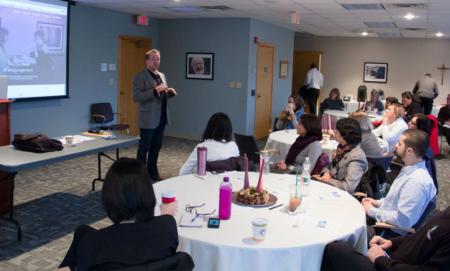Porn is growing problem but has solutions, says workshop speaker
BRAINTREE -- Pornography is proliferating in modern society largely due to the rise of the Internet, participants heard at a Dec. 9 workshop sponsored by the archdiocese's Office of Adult Faith Formation on the realities of pornography.
Matt Fradd, Catholic apologist and author of "Delivered, True Stories of Men and Women Who Turned from Porn to Purity," focused much of his talk on the protection of children in a world that he said has become saturated by pornography since the rise of the Internet.
"We live in a pornographic culture. With the advent of the Internet, we have three A's that came about, pornography became in a way what it had never been before: affordable, accessible and anonymous," he said.
He said parents should consider protective software such as Covenant Eyes, when giving multimedia devices to their children.
"If you have given your child a smartphone, and you haven't been smart enough to put accountability and filtering software on there, what you have given to your child is a portable X-rated movie theater," Fradd said.
He recommended Covenant Eyes for parents and those struggling with porn, because the program creates accountability by reporting sites a device user visits to a partner or parent designated by the user.
He said repeatedly that not taking such protective measures exposes children to things parents very likely don't want them to see.
"The problem isn't that you trust your children, the problem is that you're putting far too much misguided trust in the Internet," he said.
For much of his talk, he spoke in front of images from a section of the website theporneffect.com called "battle plan." He explained that resources such as the battle plan are required for those struggling with porn, because the impact of porn on users can have very significant effects on the brain.
He compared the release of chemicals in the brain during the consumption of pornographic material with adjusting a thermostat in a house.
"It's as if we've reset the pleasure thermostat in our brain," he said.
"What happens is the unit has to work a whole lot harder to achieve the new normal. Same thing is true with pornography addiction. Now that we've reset the pleasure thermostat, we need more of that drug, whatever that drug is -- in this case pornography -- and we need more disturbing forms of that drug, more perverted forms of that drug, just to get the same high that we got in the beginning -- in a sense just to feel normal," he said.
Fradd said not only men suffer from addiction to porn; women and the families of those men also suffer. However, he said it is not the case that only men can become addicted to porn use.
"Please recognize that porn isn't just a guy's thing. It's not just a teenager's thing. It doesn't discriminate. It's actually quite offensive to say that porn is just a guys' issue. Please stop saying that. It's offensive and it's false. It makes someone who already feels really isolated because of their sin, feel even more isolated," he said.
He said prayer and fasting can help people overcome addictions.
"Prayer without fasting is like boxing with one hand tied behind your back," he said.
He also said spiritual needs must not become a "pornified" solution by giving the addict a ritualized "fix" to replace the addiction. He said measures of real-world support, like a partner working with the Covenant Eyes app, are important in the struggle of a person trying to eliminate the use of porn from their life.
"Accountability means allowing another person to remind you of who you are and who you want to be, that's all. No recovering porn addict is an island. We need people," he said.
He said there are signs that the culture is moving away from a complete saturation of pornography in all corners of the Internet. He referenced the decision by Google to no longer allow the porn industry to advertise on their search engine.
"They got really afraid when that happened, and they ought to have been. The culture is turning," he said.
He said changes in attitudes and awareness can facilitate knowledge to help turn people away from pornography.
"If we're not incentivized by the information about how porn affects us, we're not going to be motivated to help our children and those we love be free of it," he said.
A question and answer session allowed those who attended the workshop to share their experiences and ask the speaker questions.
Anna Soto, a parishioner at Sacred Heart in Newton, told The Pilot she really enjoyed the talk and saw a calling in Fradd's message.
"As Catholics we have a mission to accomplish in this pornographic culture, and he has given us a lot of tools to start building that mission," she said.
The Archdiocese of Boston offers such workshops for clergy, religious, and lay people to help those interested in the topics addressed who teach, serve in faith formation, and build awareness of the Catholic faith in their parishes. The next workshop will feature Angela Franks, a professor of theology at the Theological Institute for the New Evangelization, speaking about Church teachings on contraception on Jan. 25.
"Our office exists to serve parish leaders and to help them to be better equipped to catechize and evangelize people in the parishes, and so there are a variety of topics that would help them to do just that," Michael Lavigne, director of the Office for Lifelong Faith Formation, said after the event.



















